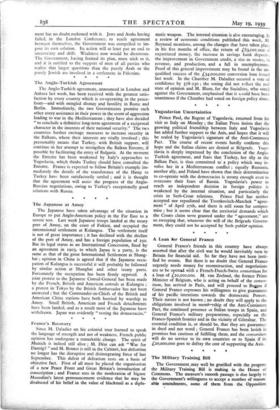Yugoslavian Uncertainties Prince Paul, the Regent of Yugoslavia, returned from
his visit to Italy on Monday ; the Italian Press insists that the growing political friendship between Italy and Yugoslavia has added further support to the Axis, and hopes that it will be sealed by Yugoslavia's signature of the Anti-Comintern Pact. The course of recent events hardly confirms this hope and the Italian claims are denied at Belgrade. Yugo- slavia is deeply impressed by the conclusion of the Anglo- Turkish agreement, and fears that Turkey, her ally in the Balkan Pact, is thus committed to a policy which may in- volve her in a Mediterranean conflict ; equally Rumania, another ally, and Poland have shown that their determination to co-operate with the democracies is strong enough even to overcome their fears of Russia. Yugoslavia's power to reach an independent decision in foreign politics is weakened by the internal situation, and particularly the crisis in Serb-Croat relations. Prince Paul has neither accepted nor repudiated the Tsvetkovitch-Matchek "agree- ment" of April 27th, and there is still room for compro- mise; but it seems clear that the territorial demands which the Croats claim were granted under the "agreement," are so sweeping that, whatever the will of the Belgrade Govern- ment, they could not be accepted by Serb publie opinion.
* * *


















































 Previous page
Previous page